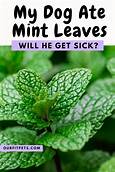Is Mint Toxic to Pets?
Mint is a versatile herb that is used in a variety of culinary, medicinal, and aromatic applications. However, its safety for pets is often questioned. While some types of mint are generally safe for pets in small amounts, others can cause adverse reactions. It is important to understand the potential risks and benefits of mint before giving it to your pet.

Toxicity of Mint to Pets
The toxicity of mint to pets varies depending on the type of mint and the amount consumed. Some types of mint, such as peppermint and spearmint, are generally safe for pets in small amounts. However, large amounts of these mints can cause gastrointestinal upset, such as vomiting and diarrhea. Other types of mint, such as pennyroyal and American wild mint, are considered toxic to pets and can cause more serious health problems, including liver damage and seizures.
Clinical Signs of Mint Toxicity in Pets
The clinical signs of mint toxicity in pets can vary depending on the type of mint consumed and the amount ingested. Common signs of mint toxicity include:
- Gastrointestinal upset, such as vomiting, diarrhea, and abdominal pain
- Nausea
- Headaches
- Dizziness
- Confusion
- Seizures
- Liver damage
- Kidney failure
- Death
If you suspect that your pet has consumed mint, it is important to seek veterinary attention immediately.
Treatment for Mint Toxicity in Pets
The treatment for mint toxicity in pets will depend on the type of mint consumed, the amount ingested, and the severity of the clinical signs. Common treatments include:
- Administering activated charcoal to absorb the mint from the gastrointestinal tract
- Providing supportive care, such as fluids and electrolytes
- Treating specific clinical signs, such as vomiting, diarrhea, and seizures
In severe cases of mint toxicity, hospitalization may be necessary.
Prevention of Mint Toxicity in Pets
The best way to prevent mint toxicity in pets is to keep them away from mint plants and products. This includes keeping mint plants out of reach, avoiding using mint-scented products in areas where pets can access them, and not feeding your pet mint treats or supplements. If you are unsure whether a particular type of mint is safe for your pet, it is best to err on the side of caution and avoid giving it to them.
Conclusion
Mint can be a safe and enjoyable herb for pets in small amounts. However, it is important to be aware of the potential risks of mint toxicity and to take steps to prevent it. If you suspect that your pet has consumed mint, it is important to seek veterinary attention immediately.
Declaration: All article resources on this website, unless otherwise specified or labeled, are collected from online resources. If the content on this website infringes on the legitimate rights and interests of the original author, you can contact this website to delete it.



